The Propaganda Model put forward by Chomsky and Edward S. Herman explains systemic bias in the media in terms of the structure of news corporations and the aligning interests of corporate owners, advertisers and others.
By and large, newspapers do not sell stories. Most of a paper’s revenue comes not from sales of newspapers to readers, but from sales of advertising space. To a newspaper, the audience is the product and that product is sold to clients to generate revenue.
From these simple relationships follow the inherent conflicts of interest which drive the media under Chomsky and Herman’s model. If the publication of a story would harm the interests of a paper’s biggest client, the paper has a strong motivation not to publish. Conversely, if a story could be presented in a way that benefited the interests of a major client or group of clients, the paper has a motivation to do so.
It’s a beautifully simple theory – and not just because I’ve over simplified it (which I have). The model relies on only two things: firstly, an uncontroversial description of the relationships between the players, and secondly, the assumption of rational, self-interested decision-making on the part of those players.
Of course, only economists believe that human beings are driven purely by rational self-interest (with the exception of sociopaths), but the behaviour of corporations has been closely studied and exactly resembles that of a rational self-interested decision-maker (or sociopath). The logic of the Propaganda Model is therefore very compelling.
Its easy to find general examples of the resulting systemic bias. For instance the Transatlantic Trade and Investment Partnership (TTIP) is hugely important but notably under-reported in the media. It stands to reason that this is because critical public discussion of TTIP is against the interests of private concentrations of wealth and power – who both stand to gain from TTIP and are the major clients of news and media advertising. Simple.
The smear campaign against Jeremy Corbyn, however, gives a rare opportunity to see something even more interesting. It’s fascinating because it’s so transparent.
Corbyn proposes things that would be fundamentally good for the vast majority of people, but bad for private corporate interests – redirecting the avoided tax of corporations into its proper public hands, for instance.
The media then gets to respond, and has a choice between attempting some objective reporting – and potentially damaging the interests of its corporate sponsors – or shooting Corbyn and his policies down through smears and ad hominem attacks, scare-mongering or sometimes just regular arguments. It’s particularly easy to see the connection between advertising money and media bias in these cases because the corporations who would lose out if Corbyn ran the country have their adverts plastered all over the articles written to undermine him.
I’m going to take two of Corbyn’s main policy objectives concerning private wealth:
1. Criminalizing tax avoidance and cracking down on tax evasion.
2. Limiting pay for the highest earners.
Let’s take a look at some of the critical articles on major news websites, identify the clients to whom the product (audience) is being sold, and consider whether the clients’ interests are effected by the two policy proposals.
(Note: to do this you may need to turn off “personalised adverts” on your web browser, unless you want to end up like Louise Mensch. And let’s face it, no one wants that. Also worth noting that these ads change when the page is refreshed. They are, however, selected from a pool of that newspaper’s client advertisers. For example, here is the Mail’s online advertising portal)
CASE 1: Corbyn could seize back shares in RBS or the Royal Mail sold off by Tories ‘with no compensation’ in order to renationalise state assets (Daily Mail, 24 August)
It goes without saying that the article presents a negative impression of the aims and methods of re-taking public ownership of recently privatised assets, despite having very little detail of the proposals themselves, and not a single quote attributed to Jeremy Corbyn. It warns of a “breach to natural justice”, “collapse of investor confidence”, that proposals could “plunder pension funds”, and “hurt charities”.
The webpage has a large main banner advertising M&S, telling us about “The Sale” in which it is offering “up to 60% off*”. These images are reprinted in wide margins on either side of the page. Lower down on the right-hand side there is an advert for Gillette Fusion Proglide. It explains this is “new” and “2-in-1”, which it further elucidates as “shave gel + skincare”. Further down still, there is an ad for Barclays bank.
Marks & Spencers:
According to the Guardian (2013), M&S were accused of scheme in which goods shipped to Europe from the UK are invoiced to an Irish subsidiary at a lower rate – effectively allowing them to pay 12.5% corporation tax (to Ireland) instead of 24% (to the UK, where the business took place).
CEO Mark Bolland received a total package of £2.1 million this year, with Head of Food Division Steve Rowe taking home £1.4 million (FT).
Gillette:
Owned by consumer goods giant Procter & Gamble. P&G were found by ICIJ journalists last year to have channeled profits through subsidiaries in Luxembourg, where they had negotiated an arrangement with the government to reduce the 29% corporation tax. Some of the several hundred multinationals involved in these Luxembourg schemes managed to achieve effective tax rates of less than 1% – for example FedEx paid about 0.25%. The full set of P&G’s leaked tax avoidance documents are here. I don’t have the time, or probably the skills, to go through them and work out exactly how much they avoided paying, but feel free.
It was announced on Friday that CEO A.G. Lafley’s pay has been cut to $18.3 million this year – a decrease from $19.5 million the year before.
Barclays:
Barclays paid £208 million in UK corporation tax last year, despite recording profits of £3.4 billion. In Luxembourg it paid just £4 million tax on a claimed £593 million profit – although it only has 30 staff working there (Guardian). Barclays owns 471 known subsidiary companies in tax havens. Until 2013 the bank operated an official Tax Avoidance Division, generating £1 billion a year, and as recently as 2012 was ordered by HM Treasury to hand back £500 million in tax it had tried to avoid.
Last year Barclays paid its CEO, Anthony Jenkins, a total annual compensation of £5.5 million, including a £1.1 million bonus.
Conclusion:
This article warns in grave and hysterical terms that moves to defend public ownership of assets from private acquisition will have dire consequences for society.
The message is sponsored by three major companies who have been accused of deliberately avoiding payment of vast amounts of tax – allowing them to keep the money instead of surrendering it to the government to be spent on public infrastructure, healthcare, education, etc. The companies CEOs were each paid enough in a year to build between 50 and 200 three bedroom houses – given the needs of the UK population at the moment this might sensibly be spent on social housing.
On this occasion it seems pretty clear that the interests of the sponsors align well with the views contained within the article.
Next.
CASE 2: Former Home Secretary Charles Clarke: “Cynical ploy” on Iraq by Corbyn (Sunday Express, 30 August)
This article is officially written by news editor Caroline Wheeler, but it is actually closer to a commentary piece by Charles Clarke himself – offering almost no analysis of Mr Clarke’s claims. Of 15 paragraphs, 9 are entirely or almost entirely comprised of quotations by Mr Clarke. A further 4 paragraphs paraphrases of statements made by him. No alternative viewpoint is offered.
We have three main ad banners again. One for Holiday Inn Express, one for Currys PC World, and one for something called NowTV.
Holiday Inn is owned by the Intercontinental Hotel Group conglomerate, who own 95 subsidiary companies in tax havens. Elsewhere it is suggested that IHG has 254 subsidiaries, 20% of which were in developing countries and 31% in tax havens. CEO Richard Solomon made an estimated £3.57 million in 2013-14.
Currys PC World is owned by Dixons Carphone – formed by merger in August last year. Prior to the merger, in 2009, Dixons was alleged to have used an elaborate system of transactions with subsidiaries on the Isle of Mann which allowed it to massively reduce the total amount of tax handed over. We may have to wait and see how robustly the newly formed Dixons Carphone engages with tax regulation. In the meantime, the CEO Sebastian James is expected to earn up to £4.9 million next year.
That brings us to NowTV – which it turns out is owned by Sky plc, in turn majority owned by 21st Century Fox. The Murdoch empire has quite a distinguished history of minimising the state’s take on its action. Reports from 1999 claim that News Corp and subsidiaries paid about 6% tax globally despite operating primarily in countries with corporation tax rates above 30%. In Murdoch’s native Australia, 21st Century Fox was reported to have paid less than 1% tax in 2014. CEO Jeremy Darroch received total remuneration of £4.88 million last year.
CASE 3: I like Corbyn, but let’s face it: we don’t need another white man at the head of a political party (Independent, 30 August)
Ad for Halifax – a banking division with a landmark tax-avoidance ruling named after it; wholly owned by Lloyds Banking Group which has made use of 259 entities in tax havens (some now closed) despite receiving a £20.5 billion bailout from British taxpayers in 2008. £11.5 million pay package for the CEO this year.
CASE 4: Corbynmania is “Alice in Wonderland” politics, says Tony Blair in final plea (Guardian, 30 August)
…bearing a water-marked banner advertising British Airways – owned by International Airlines Group, who pay a man called Willie Walsh £6.4 million in a year and, according to the Guardian, operate 13 subsidiaries in overseas tax havens.
CASE 5, Case 6, case 7….This could go on and on, but in fact that same Guardian article reporting on IAG’s overseas subsidiaries hit the nail on the head when it asked:
“Which major UK corporations keep subsidiaries in tax havens? The short answer, according to updated research by development charity ActionAid, appears to be almost all of them.”
Corbyn challenges the whole cosy relationship between government and business – in which companies aggressively avoid paying tax and politicians halfheartedly pursue tax avoiders. With big business as the primary client of media advertising services, it’s no wonder that coverage of Corbyn has been overwhelmingly and aggressively negative. The interests of big business, big media, and establishment politics are harmoniously aligned, inexorably channeling money away from the public accounts for which it was earmarked, and into the offshore coffers and vast asset-kingdoms of executives, bankers and fund managers – the one percent, as they’re known.
The great hope of the Corbyn campaign is that the common good, whatever that may be, can replace petty self-interest as the aspiration of our society. Corbyn is right to say that “diversity in media is something that is intrinsic to a democratic society” – as reported in the Guardian. But contrary to Roy Greenslade tag-line in that same article, Corbyn doesn’t mean Rupert Murdoch in particular – or at least he shouldn’t. The Guardian’s willingness to throw Labour’s left-wing candidate to the dogs with barely more qualms than the Telegraph should make clear enough that there are interests at work other than a sense of journalistic integrity. The ad banner just a few inches away from Roy Greenslade’s face – advertising the aforementioned Procter & Gamble’s Olay brand – is a clue: that when it comes down to it, the Guardian and the Telegraph feed from the same trough.
Rainsborough
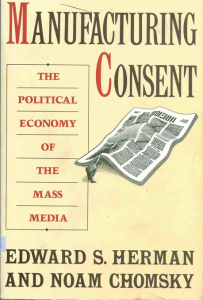
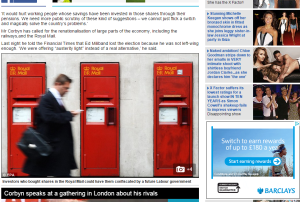
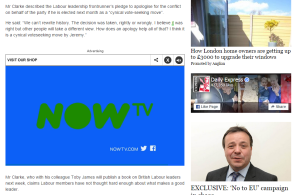
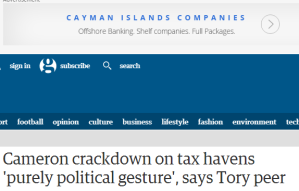
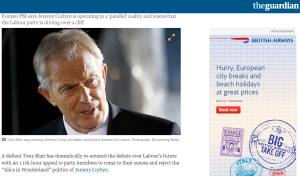
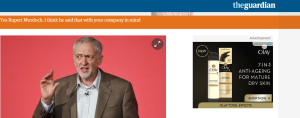
Excellent! This reminds me a little of work I undertook for the FBU in Brighton 1978-9 dealing with the attacks on the Union in the fire brigades strike. We felt there should be a Standing Committee Against News Distortion And Lies (SCANDAL) to enable a coordinated and sustained fight back against and investigation into the way news is manufactured.
LikeLiked by 1 person
Reblogged this on disabledsingleparent.
LikeLike
Tweeted @melissacdae68
LikeLike
Ooops, that should be Tweeted melissacade68
LikeLike
“Corbyn proposes things that would be fundamentally good for the vast majority of people.” In that case there is nithing to wworry about. Jeremy Corbyn will obviously be elected leader of the Labour Party and will then win a resounding victory in the 2020 election. The “vast majority” of people will vote for what is “fundamentally good” for them.
Won’t they…?
LikeLike
This is a powerful piece (though it would be more convincing with some proofreading).
It did occur to me to wonder, if newspapers serve only the interests of their clients, why the Guardian would run an article that reveals that “almost all” major UK corporations aggressively avoid paying tax – but I suppose it needs to publish *some* genuinely left-wing stuff if it is to deliver educated left-leaning consumers to its clients (which I guess is its USP), and also no individual client looks quite so bad if “almost all” corporations are guilty of the crime.
LikeLike